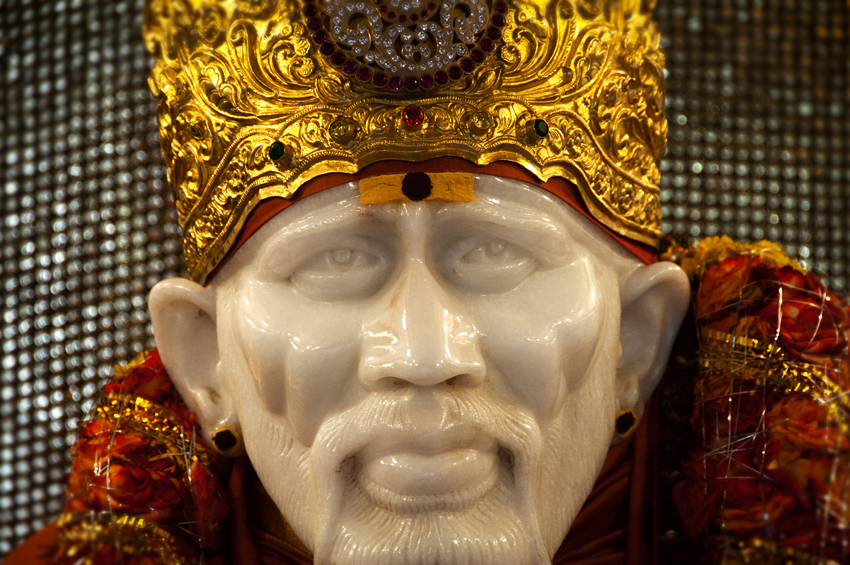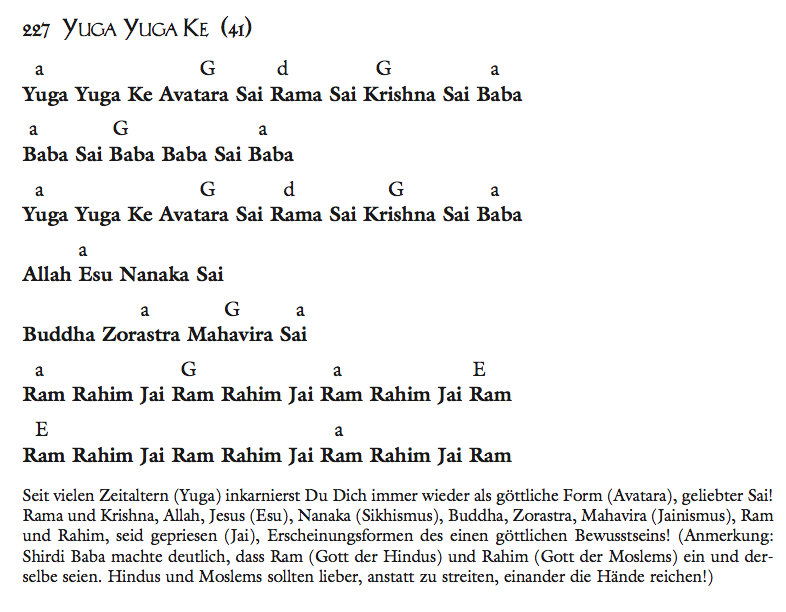227 Yuga Yuga Ke (41)
Info
227 Yuga Yuga Ke (41)In the attachments below you will find the guitar chords for this bhajan.
German:
In den Attachments unten findet ihr die Gitarren Akkorde zu diesem Bhajan.
Czech:
V příloze níže naleznete kytarové akordy pro tento bhadžan.
Meta
227 Yuga Yuga Ke (41)
Category: Master
Posted On: March 09th, 2019
Last Edit: August 30th, 2020
New Number: 227
Old Number: 41
Comments: No Comments
Changes
no further informationLyrics
227 Yuga Yuga Ke (41)Yuga Yuga Ke Avatara Sai Rama Sai Krishna Sai Baba
Baba Sai Baba Baba Sai Baba
Yuga Yuga Ke Avatara Sai Rama Sai Krishna Sai Baba
Allah Esu Nanaka Sai
Buddha Zorastra Mahavira Sai
Ram Rahim Jai Ram Rahim Jai Ram Rahim Jai Ram
Ram Rahim Jai Ram Rahim Jai Ram Rahim Jai Ram
Bhajan Training
227 Yuga Yuga Ke (41)Audio
227 Yuga Yuga Ke (41)Video
227 Yuga Yuga Ke (41)2013-10-14 Sankirtanacharia
Comment: This is a recording from the Mother Divine Festival 2013 in Laytonville, California, USA
Explanations
227 Yuga Yuga Ke2013-09-12 Explanations from Sabeena in english:
Bhajans honour and unify all religions. That is so wonderful. Like Swami Kaleshwar said: ‚There are many candles, but only one light.‘ That ist he truth and we all know it deep in our hearts.
We have this wonderful Bhajan ‚Yuga Yuga Ke…‘ (Nr. 41 in the official Shiva Sai Mandir Bhajan Book), which was also very important to Swamiji. It describes how the Divine is manifesting from time to time to bless the world and uplift it. We honour here all the great souls and founder of new religions like Rama, Krishna, Allah, Jesus, Nanaka (Sikhism),Buddha, Zorasthra (one of the oldest religions at all- worship of fire), Mahavira (Jainism) and of course Shirdi Baba!
In the last two lines we sing ‚Ram Rahim Jai…‘ over and over again. There is a deep meaning behind it. Shirdi Baba mentioned once that Ram (Hindu God) and Rahima (God of the Moslems) are one and the same! Hindus and Moslems should instead of fighting with each other shake hands!
Maybe it is good to remember that Shirdi Baba lived amongst Hindus and Moslems with all the conflicts going on all the time. He himself made never clear if he was a Hindu or Moslem. Therefore we could say that this Bhajan is a true peacemaker- song!
There are many candles, but only one light.‘ – Sri Kaleshwar
Have a wonderful week with the one light in your heart – Sabeenamayi.
2013-09-12 Explanations from Sabeena in german:
Bhajans vereinen und ehren alle Religionen. Das ist so wundervoll und einfach die Wahrheit. Wie kann es nur eine Religion geben und alle anderen sind falsch. Das machte mir schon als Kind einfach keinen Sinn. Swami Kaleshwar sagte dazu: ‚There are many candles, but only one light.‘ (Es gibt viele Kerzen, aber nur ein Licht.) Wir wissen das alle tief in unseren Herzen.
Wir haben in unserem Bhajanbuch dazu einen Bhajan, der auch Swami sehr wichtig war: ‚Yuga Yuga Ke…‘ (41). Er beschreibt, dass von Zeitalter zu Zeitalter (Yuga) eine besonders kraftvolle göttliche Manifestation (Avatara) auf die Erde kommt um die Menschen wieder auf den rechten Weg zu bringen und ganz allgemein die Energie anzuheben. In diesem Lied ehren wir all diese großen Seelen und Religionsbegründer wie Rama, Krishna, Allah, Jesus, Nanaka (Sikhismus), Buddha, Zorasthra (eine der ältesten Religionen überhaupt, die die Kraft des Feuers verehrte), Mahavira (Jainismus) und natürlicha Shirdi Baba!
In den letzten beiden Zeilen singen wir immer wieder ‚Ram Rahim Jai…‘ Auch hierin liegt eine tiefe Bedeutung. So hat Baba einmal gesagt, dass Ram (Gott der Hindus) und Rahima (Gott der Moslems) ein und derselbe seien. Und alle täten besser daran, sich endlich die Hände zu reichen, anstatt sich weiter zu verfeinden!
Diese Aussage ist umso bedeutender, wenn man sich klar macht, dass Shirdi Baba damals inmitten von beiden Religionen lebte und er selbst nie eindeutig als Hindu oder Moslem zu erkennen war. So gesehen kann man diesen Bhajan als ein echtes Friedenslied verstehen.
There are many candles, but only one light.‘ ( Es gibt viele Kerzen, aber nur ein Licht.) – Sri Kaleshwar
Sabeenamayi


